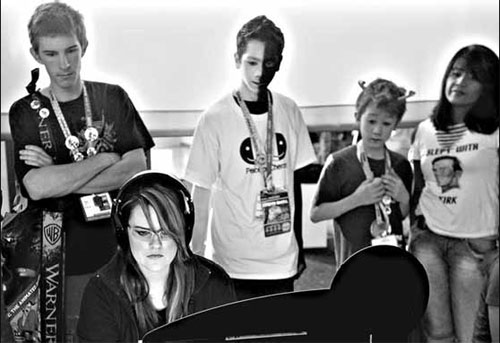Sexual harassment in the gaming world
Updated: 2012-08-12 07:53
By Amy O'Leary (The New York Times)
|
|||||||||||
|
|
When Miranda Pakozdi participated in the Cross Assault video game tournament this year, her team's coach, Aris Bakhtanians, interrogated her on camera about her bra size, said "take off your shirt" and focused the team's webcam on her chest, feet and legs.
For Ms. Pakozdi, 25, an experienced gamer, this was too much. And when she overheard Mr. Bakhtanians defending sexual harassment as part of "the fighting game community," she forfeited the game.
Sexism, racism, homophobia and general name-calling are longstanding facts of life in certain corners of online video games. But the Cross Assault episode was the first of a series this year that have exposed the severity of the harassment that many women experience.
And a backlash - on Twitter, in videos, on blogs and even in an online comic strip - has moved the issue beyond endless debate among gaming insiders.
Executives in the $25 billion-a-year industry are taking note. One game designer's online call for civility prompted a meeting with Microsoft executives about how to better police Xbox Live. In February, LevelUp, an Internet broadcaster of gaming events, barred two commentators who made light of sexual harassment on camera and issued an apology.
Even so, Tom Cannon, co-founder of the largest fighting game tournament, EVO, pulled his company's sponsorship of the weekly LevelUp series, saying that "we cannot continue to let ignorant, hateful speech slide."
The issues raised by the Cross Assault episode gained more attention with Anita Sarkeesian's campaign in May to raise $6,000 on Kickstarter to document how women are portrayed in video games. Her YouTube and Facebook pages were instantly flooded with hate-filled comments. People tried to hack her online accounts. She received threats.
Ms. Sarkeesian responded by documenting the harassment, posting online the doctored, pornographic images of herself that her detractors had created. Supporters of her efforts, aghast, donated more than $150,000, further angering her critics. A man from Ontario created an Internet game where players could "punch" her.
"The gaming industry is actually in the process of changing," Ms. Sarkeesian said. "That's a really positive thing, but I think there is a small group of male gamers who feel like gaming belongs to them, and are really terrified of that change happening."
When Sam Killermann, a gamer in Austin, Texas, saw the reaction to Ms. Sarkeesian's project, he began a campaign for "Gamers Against Bigotry," asking people to sign a pledge supporting more positive behavior. The site received 1,500 pledges before it was hacked, erasing its list of names.
Like Ms. Sarkeesian, many female gamers are documenting their experiences on blogs like "Fat, Ugly or Slutty" (whose name comes from the typical insults women receive online). It catalogs the slurs, threats and come-ons women receive while playing games.
Jessica Hammer, a researcher at Columbia University in New York, said the percentage of women playing such games online ranges from 12 percent to close to half, depending on the game type.
The women's presence is often criticized as "distracting." Some have been offered money or virtual "gold" for online sex. Some have been stalked online and in person.
James Portnow, a game designer who has worked on the games Call of Duty and Farmville, wrote about harassment for his animated Web series "Extra Credits." In it, the narrator says: "Right now, it's like we gave the school bully access to the intercom system and told him that everyone would hear whatever he had to say. It's time we take away that megaphone."
At the end of the video, viewers were encouraged to e-mail the Xbox Live team at Microsoft, asking for changes to communication tools and improvements to reporting systems.
Microsoft confirmed it was working toward improvements to its community tools.
"For the longest time, people have seen games as a children's pastime, and we as an industry have stood behind this idea," said Mr. Portnow. "But that's not true any longer. We are a real mass medium, and we have a real effect on the culture. We have to take a step beyond this idea that nothing we could possibly do could be negative, or hurt people."
Today's Top News
President Xi confident in recovery from quake
H7N9 update: 104 cases, 21 deaths
Telecom workers restore links
Coal mine blast kills 18 in Jilin
Intl scholarship puts China on the map
More bird flu patients discharged
Gold loses sheen, but still a safe bet
US 'turns blind eye to human rights'
Hot Topics
Lunar probe , China growth forecasts, Emission rules get tougher, China seen through 'colored lens', International board,
Editor's Picks

|

|

|

|

|

|






